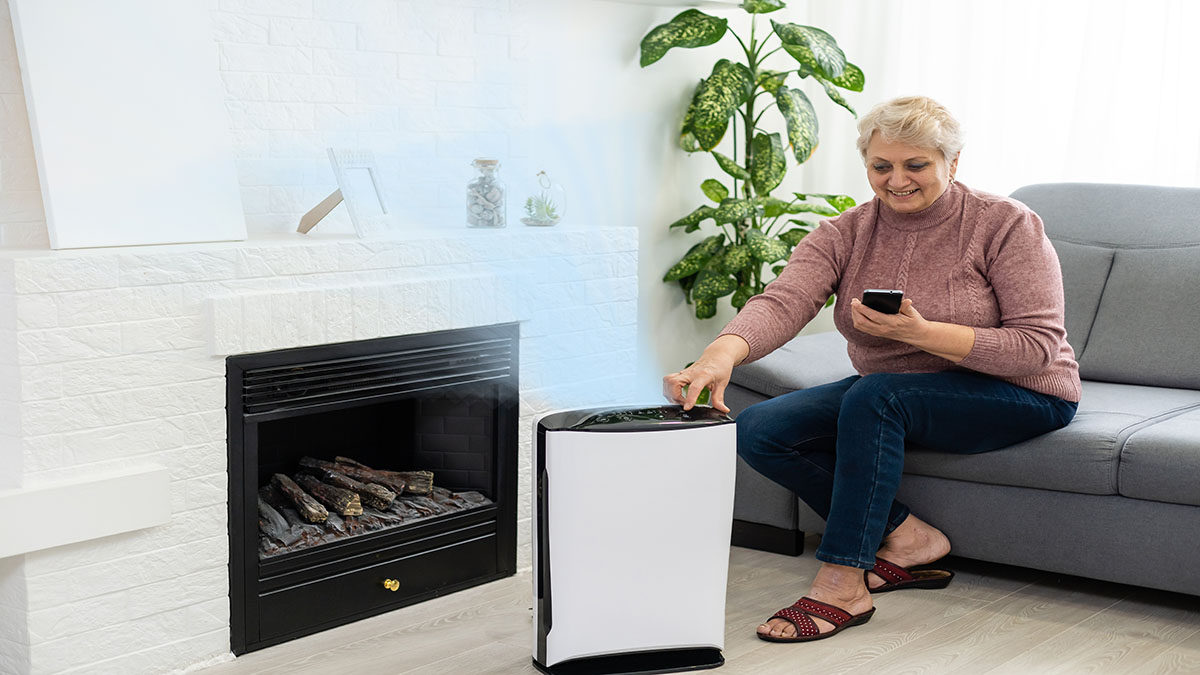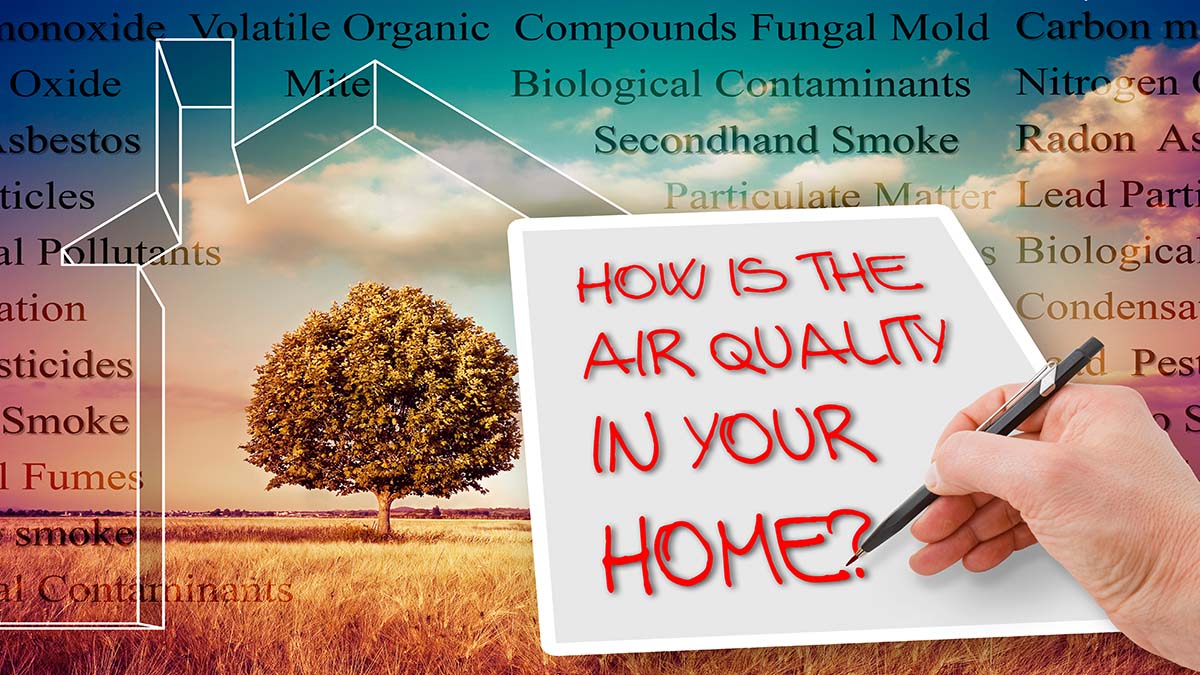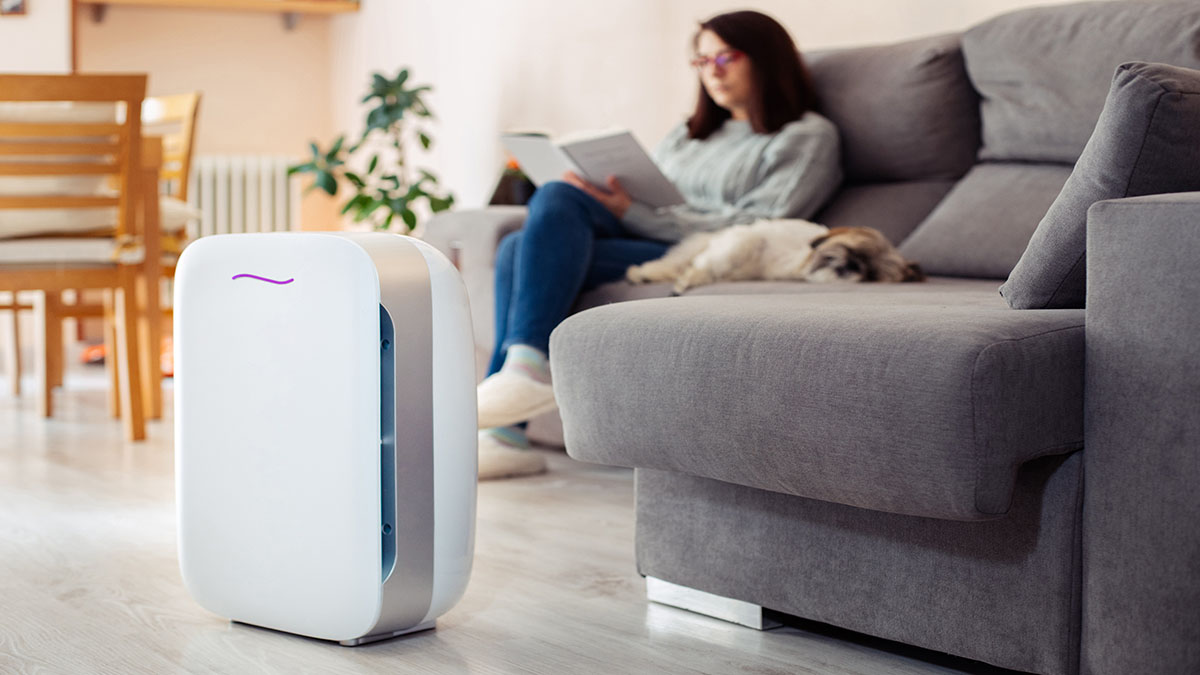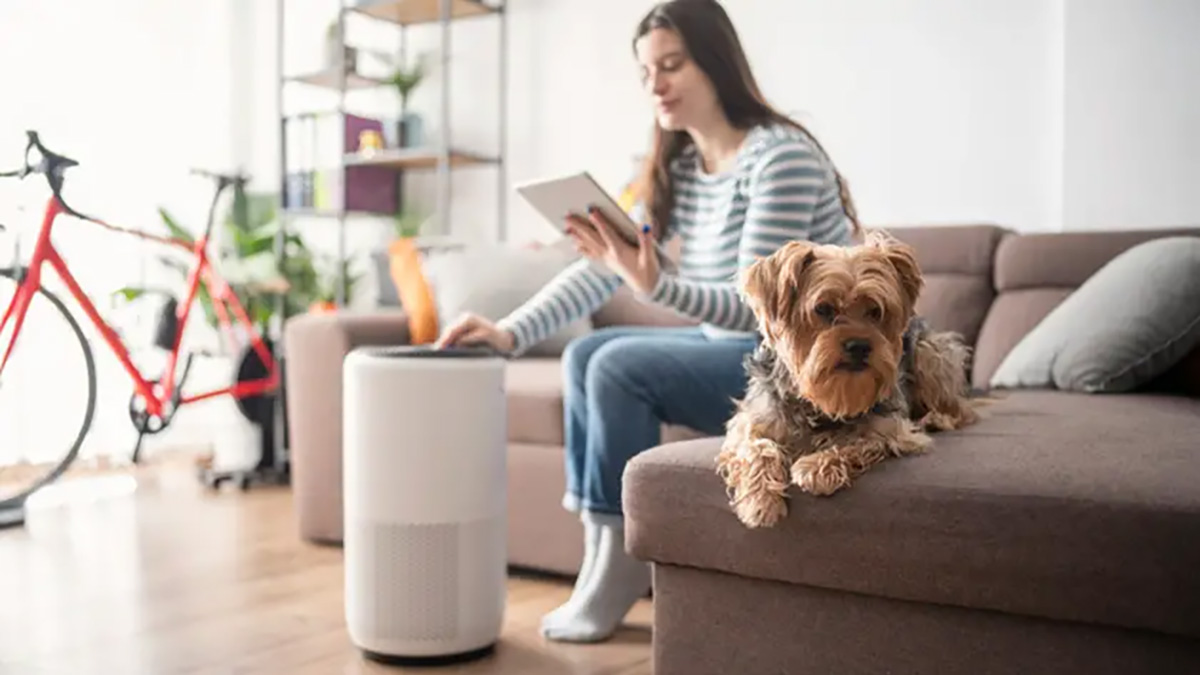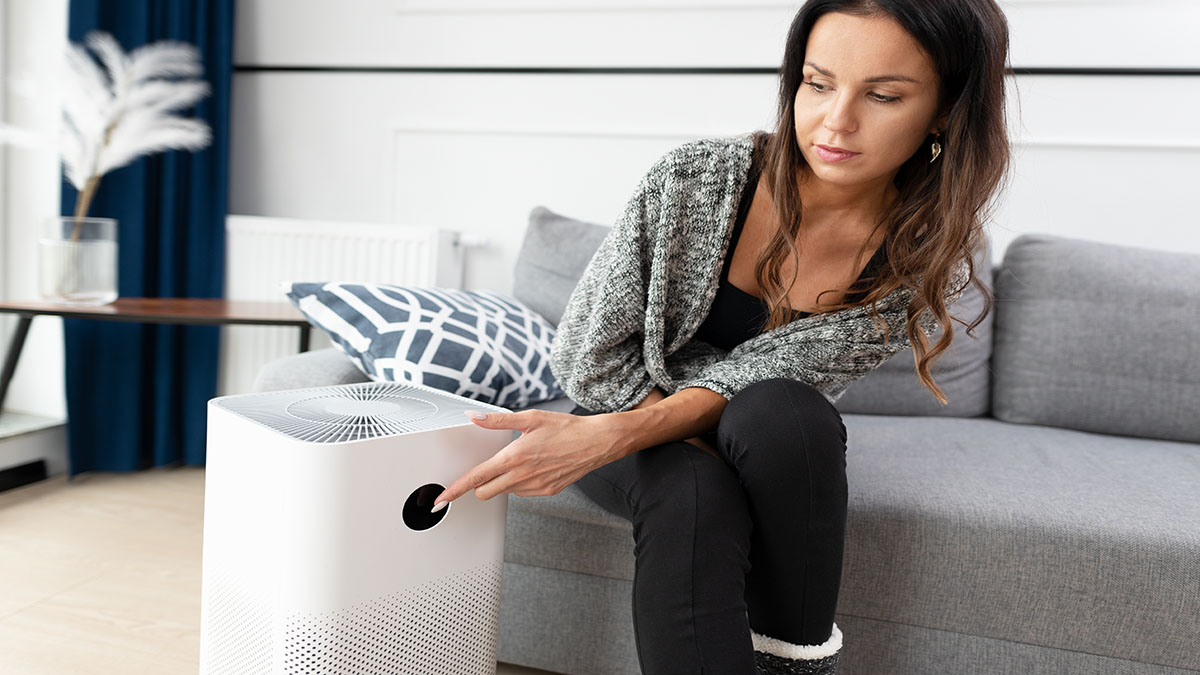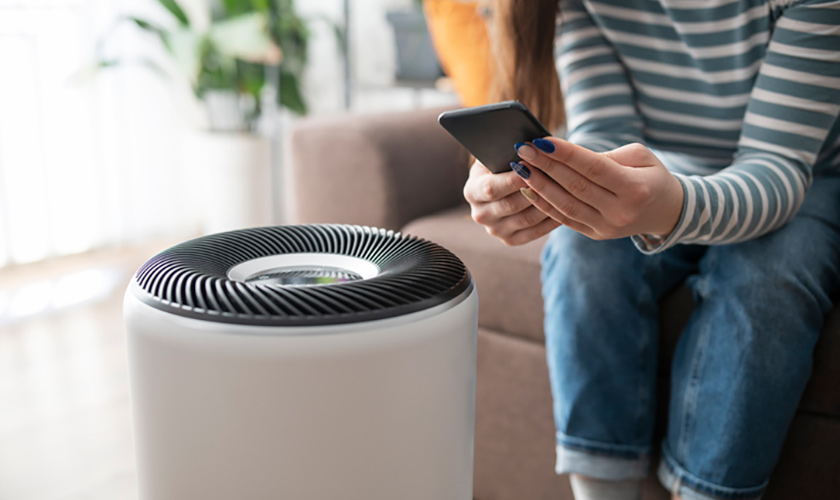
The air we breathe is a hot topic, with discussions typically focused on indoor air quality, allergy symptoms, and asthma. We compare air purifiers vs ionizers to get to the bottom of what these machines do to improve indoor air quality.
Air Purifier vs Ionizer: Key Differences
An air purifier uses a fan with HEPA filtration to eliminate indoor air particles, such as dust, pollen, pet dander, and toxins that cause allergies or asthma. They are designed to remove particulates of various sizes, including coarse ones (like pollen), fine ones (like pet dander), and ultrafine particles (like smoke or viruses).
An ionizer puts out ions into the air. These ions react with particles and make them heavier. This way, they can’t stay in the air as easily. It doesn’t filter out all indoor air pollution, though. Microscopic contaminants, like 0.1 microns, may end up falling to the floor or landing on other surfaces in the room.
How Air Purifiers Work
An air purifier captures particles using physical filtering, preventing you from breathing them in. On the other hand, ionic air purifiers emit negative ions into the room and attract positively charged dust and pollutants, making them heavier and falling to the floor.
High-Efficiency Particulate Air (HEPA) filters are more limited than ionizers because they can’t remove smaller particles. HEPA filters have grades. The higher the grade, the more particles it can capture from the air. For example, an H13 HEPA filter removes more airborne particles than an H11 HEPA filter.
HEPA filters can remove 99.97% of the larger dust, allergens, and microorganisms contributing to respiratory problems before they can enter your lungs while you sleep. According to the Environmental Protection Agency (EPA), HEPA filters can remove almost all airborne particles that are 0.3 microns.
Air purifiers work to remove particles from the air. This means you don’t have to vacuum or dust as often because the particles won’t be able to get back into the air. This is why HEPA air purifiers are popular among people who suffer from allergies or are sensitive to dust, mold, or mildew.
Recently we asked Dr. Sabrina Kong, DVM, if ionizers are effective at helping people with pet allergies. She states, “Not really. Ionizers are designed to remove smaller molecules like bacteria and viruses, making them relatively ineffective at removing larger particles that cause allergies such as dust, pollen, and pet dander.”
Air purifiers for pets often have a washable pre-filter that captures pet hair and protects the HEPA filter.
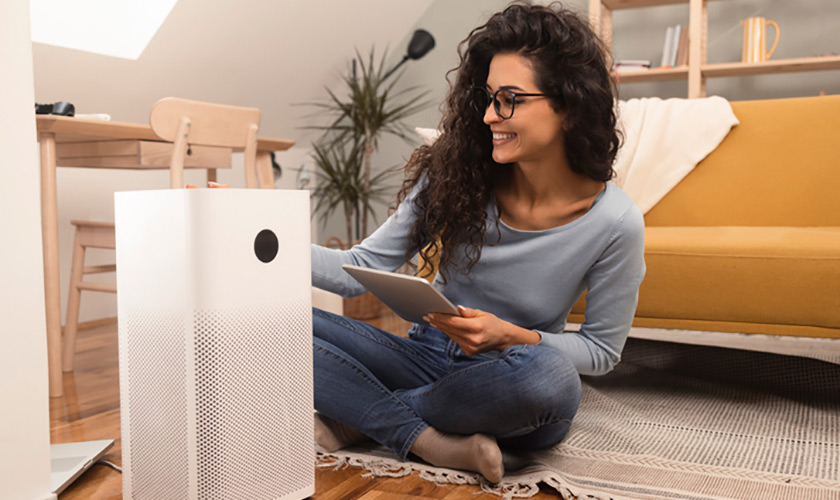
How Air Ionizers Work
An air ionizer puts negative ions into the air. These negative ions react with particles and make them heavier. This way, they can’t stay in the air as easily. It doesn’t filter out the particles, though. Any tiny contaminants, like 0.1 microns, may end up falling to the floor or landing on other surfaces in the room.
The particles are too heavy to stay in the air, so you don’t have to worry about breathing them in. You can remove them with a duster or vacuum during regular cleaning. However, for an ionizer to work correctly, you need to dust or vacuum often because otherwise, pets and people will move the particles back into the air.
Air Purifier vs Ionizer: Key Considerations
Air purifiers and ionizers are both devices that clean the air. They remove allergens and pollutants from the air by making it pure. Air purifiers work to trap particles in a filter. Ionizers work by charging the particles so that they stick to surfaces in the room.
Air purifiers clean the air by drawing in dirty air and cleaning it through filtration. The filter captures any particles in the air, including dust, pollen, mold, and bacteria.
Air ion generators use the chemical properties of ions to remove particles and germs from the air. Ionizers create negative ions with electricity. Negative ions attach to positively charged objects in the environment, such as dust and pollen, forming a dense particle that falls to the ground.
When asked about a HEPA air purifier vs ionizer, Dr. Sean Ormond told us that “HEPA filters are effective because air purification with HEPA filters is designed to remove 99.97% of particles that are 0.3 microns in size. So it helps reduce some of the larger-sized particles like airborne dust, pet
dander and dust mites in your home.”
He continued by stating, “Ionizers are better at removing smaller molecules like bacteria and viruses, so they may not benefit those suffering from allergies or asthma. Ionic purifiers also don’t remove the particles from circulation.”
Ozone generators produce negative ions that can prevent the spread of airborne viruses. The ozone produced by the mix of negative ions and other particles can destroy germs, mold, and fungi. On the other hand, the EPA considers air ionizers ineffective at removing larger particles like dust or pollen. They’re better suited to smaller contaminants like tobacco smoke or smog that measure between 0.01 and 0.1 microns in size.
Air purifiers and ionizers produce clean air in different ways. Air purifiers use HEPA filters to capture large and small particles. You will need routine HEPA filter replacement. Ionizers emit electrically charged particles to remove pollutants from the air. It is important to note that while this reduces the number of particles, it does not get rid of them entirely from the environment.
Ozone emission is one of the dangers incurred by ionic air cleaners. When ionizer air purifiers emit charged particles, they typically generate small amounts of ozone. Ozone sensitivity is common, and some people may have an allergic reaction to high levels of it in their homes. If you’re one of them, an ionizing air purifier will not be appropriate for you and might exacerbate existing breathing problems.
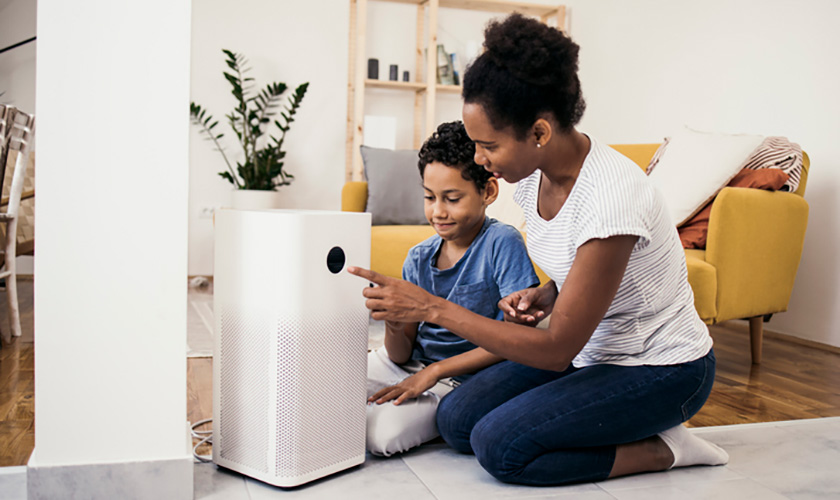
Air Purifier vs Ionizer: Which Provides the Best Indoor Air Quality
All the technologies mentioned above, except ultraviolet light, work to purify the air. The best air purifiers trap airborne particles, while ionizers make them heavy enough to fall to the ground and furniture, requiring more frequent vacuuming and dusting.
Air ionizers aren’t as effective at removing allergens and asthma triggers when they remove a far more targeted range of particles. That isn’t to imply that they aren’t beneficial; instead, it’s essential to understand what causes allergies before investing in an ionizer.
Negative ions generated by ionizers improve psychological health, productivity, and overall well-being and aid those suffering from seasonal affective disorder (SAD).
On the other hand, regular ionizers indirectly produce ozone – three oxygen particles bound together via their negative ions encounter with dust particles. Ozone is a respiratory irritant that is harmful in some circumstances.
The EPA warns that breathing small amounts of ozone gas can cause throat irritation, chest pain, hacking, shortness of breath, or difficulty breathing in the short term. Long-term consequences include an increase in asthma symptoms, a lowering in lung function, and lung inflammation.
Air Purifier vs Ionizer: Which is Best for You?
Because it keeps particles out of the air you breathe, a HEPA air purifier is more likely to help you if you have asthma, allergies, or other respiratory problems. It’s also an excellent choice if you’re worried about high ozone levels in your house.
One advantage of ionizers over other air purifiers is that you don’t need to replace a filter. This makes them easier to maintain. However, remember that you will need to dust or vacuum more often to remove particles from the floor. Another plus is that they can cover larger areas and eliminate smaller particles from the air than HEPA purifiers can.
Not only do air purifiers typically cost more than ionizers do, but you also have to replace their filters twice a year. To get an accurate estimate of the total cost of ownership, be sure to factor in the replacement filter costs when making your decision.
Medical-grade air purifiers often utilize a minimum of 3-stage filtration, which includes:
- Carbon filters for odors, cigarette smoke, volatile organic compounds (VOCs), and harmful chemicals
- H13+ HEPA filter that removes up to 99.97% of airborne pollutants
- a negative ion generator that is safe and produces no ozone gases
According to Veterinarian and Animal Behaviorist Dr. Paola Cuevas Moreno (MVZ), “medical-grade air purifiers can filter away even smaller particles than regular HEPA filters alone. Additionally, most medical-grade air purifiers also have a sterilization mechanism.”
See our recommendations for the best air purifier for large rooms, many of which have a multi-stage air filtration process.
Air Purifier vs Ionizer: Our Verdict
If you are worried about mold, viruses, or bacteria in your home, you should consider a medical-grade air purifier or an air sanitization device that uses UV light. Devices with UV light will kill most micro-organisms that make people sick, but they won’t remove dust and other particles like dog hair, fur, or cat dander from the air.
For maximum results, you can use an air purifier to improve the air quality in your home that utilizes both HEPA filtration and an ionizer. So if allergies are a problem for you, a medical-grade air purifier would be a good choice.



